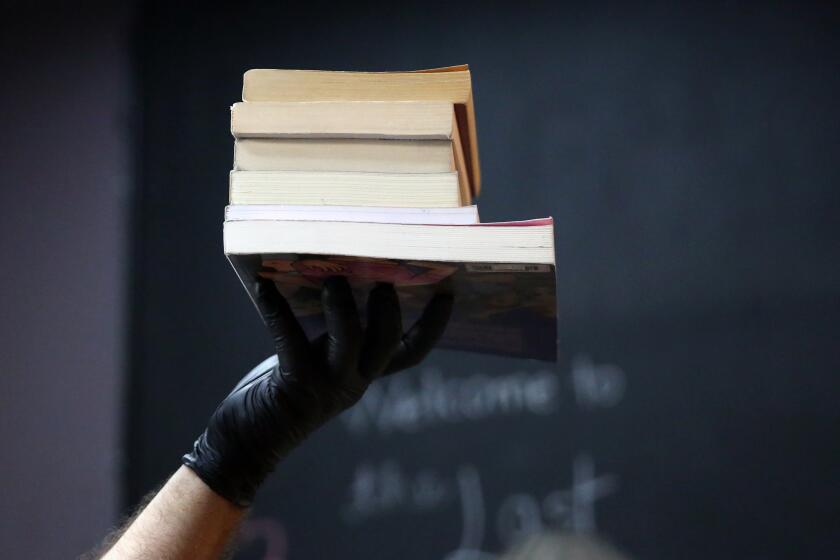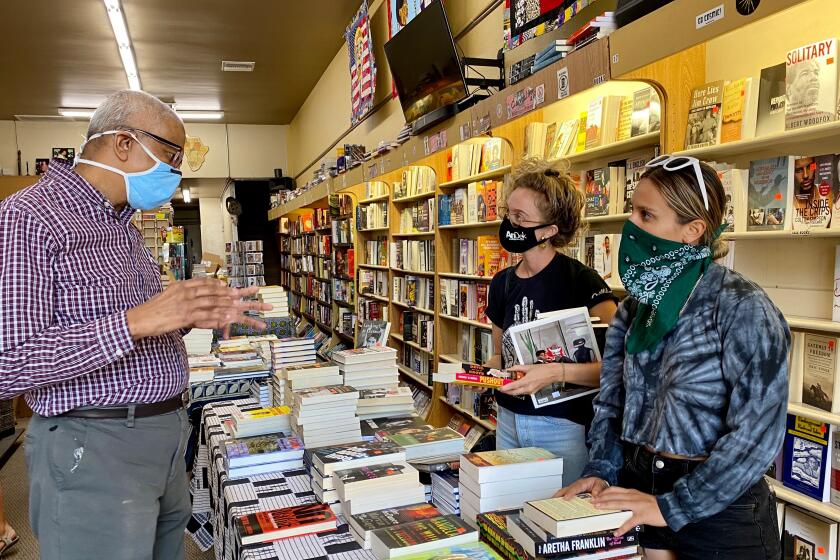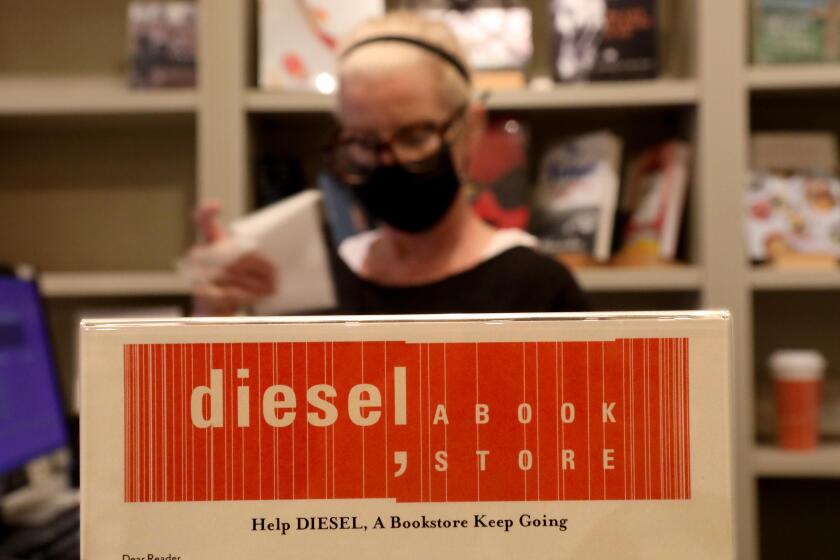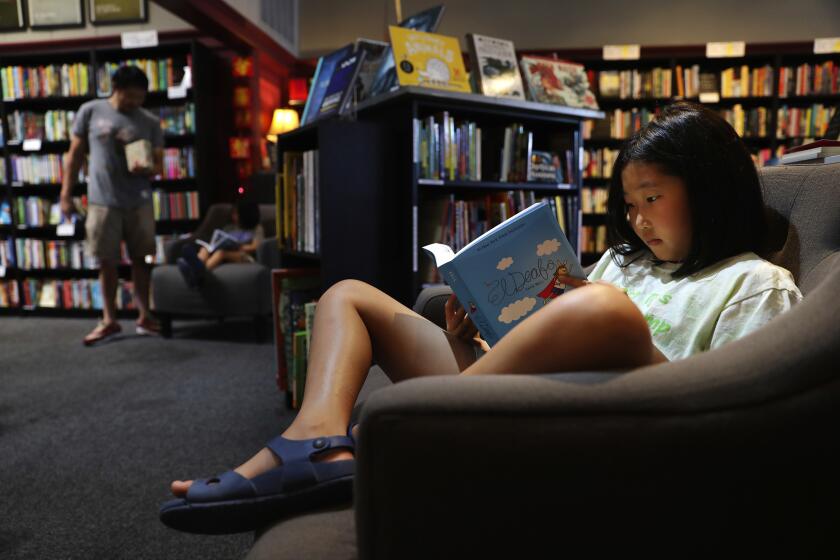For L.A. bookstores during COVID-19, this holiday season is make or break
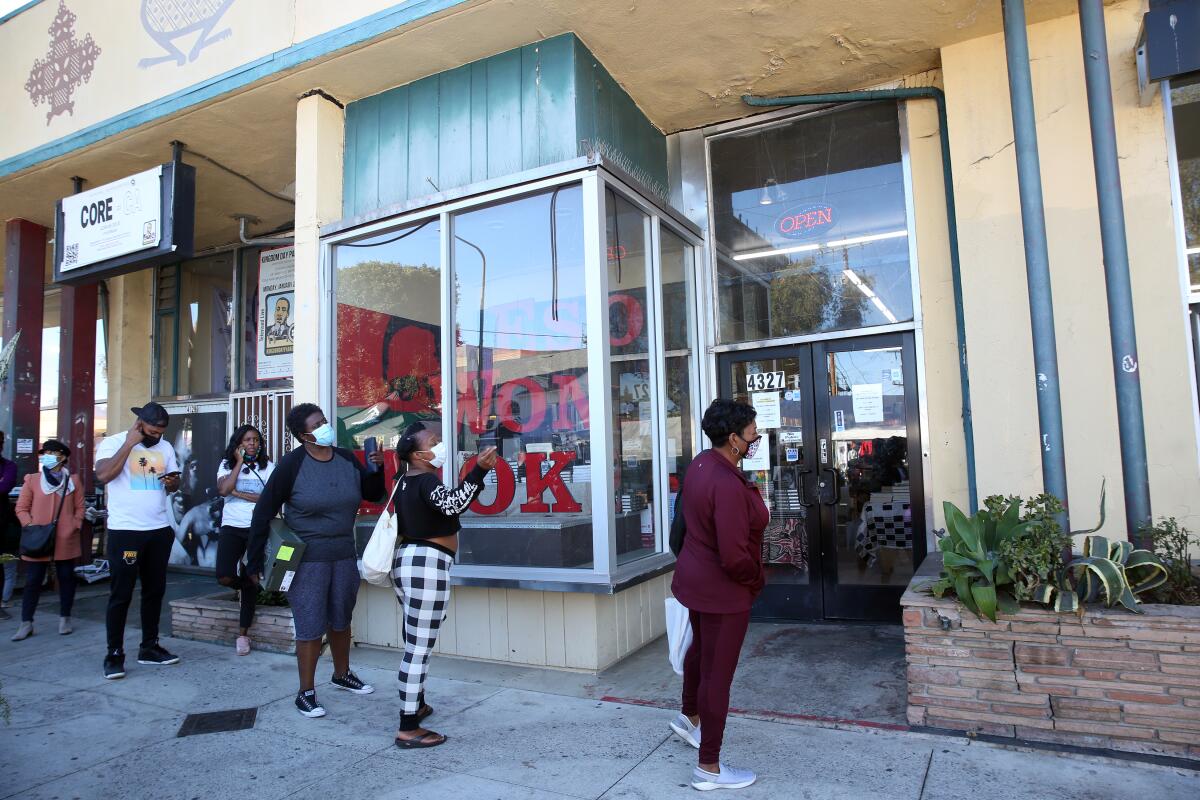
- Share via
Two days after Thanksgiving, on what is sometimes known as Small Business Saturday, Jennifer Gracie plopped a stack of hardcovers onto the checkout desk of Chevalier’s Books, a charming shop in Larchmont Village. The haul for Gracie, a 54-year-old transplant from New York, included an Italian cookbook for her husband; a crime novel for her mother; guidebooks for her daughter and friends; and a David Bowie puzzle for her sister-in-law.
It could have been any other holiday shopping season, except for the masks, the plexiglass barrier separating Gracie from the salesclerk and the sign at the window that read, in part, “Max Occupancy 6 Customers.” There was, too, the sense of urgency and mission, among both store employees and customers lined up outside.
“Even if I see something that I know is easily available through overnight shipping through that behemoth we all know about, I have to buy it at a real bookstore,” said Gracie, referring to the dominance of Amazon. She chose to shop in person despite the pandemic, and also because of it. “It just makes me so sad when I see all the bookstores shuttered around the country, and it’ll be tragic if we keep losing them.”
With curbside pickup and even some in-store visits available, there’s no reason to buy books at an online mega-store. Here’s a list of locals instead.
Since the pandemic swept through the U.S. in March, independent bookstores have struggled to survive a gantlet of ever-changing restrictions: mandated store closures, partial reopenings, caps on in-store browsers and, in California, a stay-at-home order that further restricts retail capacity. According to the American Booksellers Assn., 58 member bookstores across the country have closed for good this year and 20% are in danger of shuttering after the holiday season.
This time of year accounts for 20% or more of annual small-business sales, enough to get retailers out of the red — beginning of course with Black Friday. But this year, especially for bookstores, it’s not a question of balancing the books but mitigating the damage of a lost year. The Saturday after Thanksgiving, visits to three bookstores revealed devoted customers like Gracie braving the surge in advance of the latest lockdown. For local booksellers it was a day of promise but also renewed worry.
Despite the heartening lines, owners had to wonder whether it would be enough. With federal financial support depleted, further stimulus funding up in the air as of this writing, foot traffic still relatively low, popular events canceled and a record-breaking spike of cases, it’s going to be a close call for almost everyone.
As California bookstores gradually being to reopen during the coronavirus pandemic, here’s a closer look at the state of the industry.
“We definitely look forward to the holidays in the same way that movie studios look forward to blockbusters,” said Josh Spencer, owner of downtown L.A.’s the Last Bookstore. “For us, the holiday season pays for half of the year. We’re generally losing money the rest of the time.”
In the wake of the first lockdown, sales plummeted as much as 80% for local bookstores before improving steadily in recent months, though still significantly below that of previous years.
“The holiday shopping season is the make-it-or-break-it season for indie bookstores,” wrote ABA senior strategy officer Dan Cullen in an email. “Not only will their regular customers be shopping with them but this is when they see many first-time shoppers, who then can become new regular customers in the weeks and months ahead.”
Ultimately this is what success might hinge on — not only the goodwill of existing customers but an influx of new ones and, once the virus abates, the return of habitual in-store shopping. Because one of the biggest lessons learned for bookstores in 2020 is that online orders and loyal customers help, but not enough to ensure their long-term survival.
The online surge
Even before the holiday season began in earnest, booksellers in California and across the country were making public pleas for support, sometimes in the form of online fundraisers. (Stories in Echo Park is the latest indie to launch a GoFundMe.) In October, the 80-year-old Chevalier’s sent customers an SOS: Its building was forcing all tenants to vacate by Dec. 31, and its new location across the street would be larger but more expensive.
The response was overwhelming.
“After we sent that letter out … we’ve basically experienced a Christmas every month,” said Theresa Phung, co-manager at Chevalier’s, noting a 40% to 50% spike in revenue. She’s confident that December sales will be as strong as October‘s and November‘s. But the real test will come when the store is paying twice the rent next year. “We’ll really have to see how the community responds after we make that big jump.”
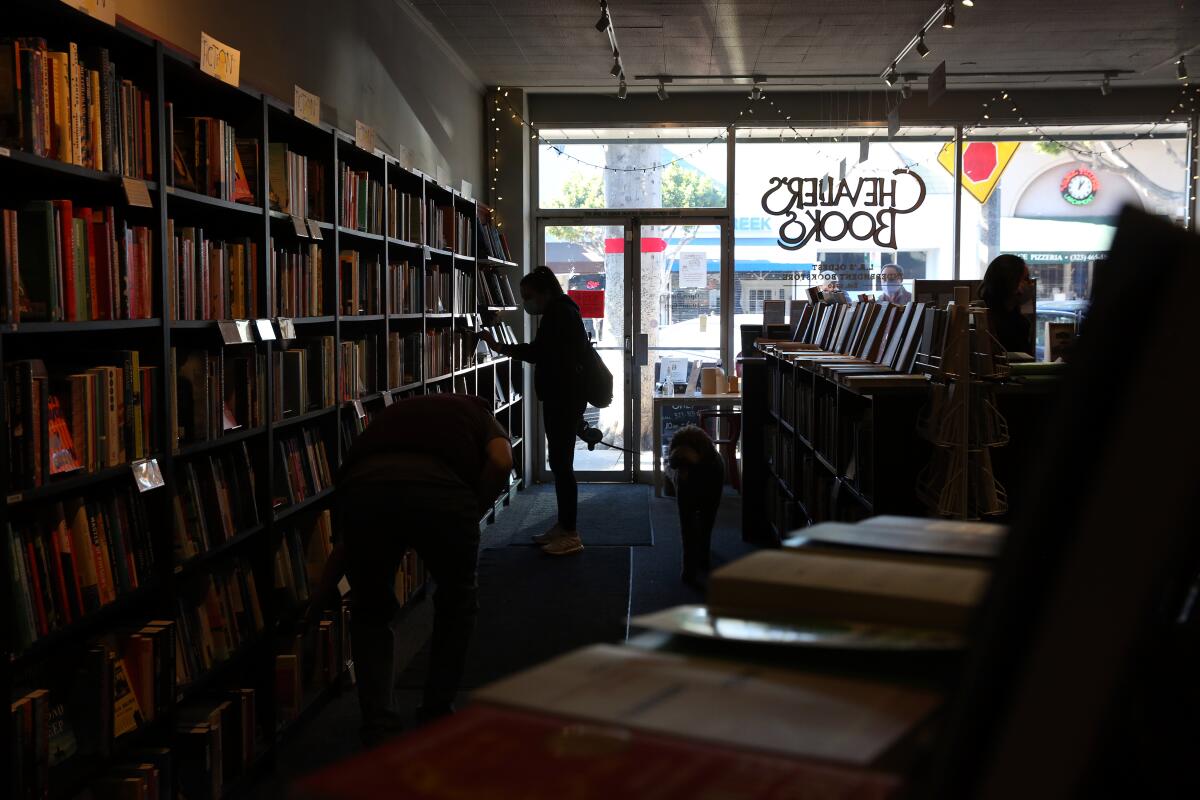
Eso Won Books in Leimert Park has seen a sales jump too — for another timely reason. Following protests sparked by the death of George Floyd, the Black-owned bookstore experienced “this insane influx of business,” according to co-owner James Fugate. Up to 1,000 book orders were coming in daily. The phone rang so often that Fugate and co-owner Tom Hamilton decided to stop answering it.
Sales have been steady since then. But despite the surge of interest in books on racism and support for shops like Eso Won, Black-owned businesses have been especially vulnerable during the pandemic. According to a study published by Stanford University in May, 41% of such businesses across the country shut down between February and April, compared with 17% of white-owned establishments.
Sales have soared at Leimert Park’s Eso Won books over the past few days, as a stream of customers have come in seeking to better understand the historical underpinnings of the current moment.
“As a Black-owned business, you don’t have the luxury of just being a business, you have to be part of the community,” said Kokayi, 41, a regular customer who declined to give his last name. “You have to fight for Black businesses.”
For Eso Won, the sales surge has provided at least a temporary reprieve. “While we’ve had a great summer, we don’t know if we could survive another year of this,” said Fugate, who celebrated his 66th birthday on a busy Small Business Saturday. For now, “we’ll hang on.”
Among the timely and topical releases bookstores across the region are counting on is Barack Obama’s “A Promised Land.” With its $45 list price, the former president’s memoir has been a lifeline for struggling indies, as has the signed deluxe edition, priced at $350. The memoir sold nearly 890,000 copies within 24 hours of its Nov. 17 release; Eso Won has sold nearly 200 copies in store and about 700 online, and it expects to sell more for the holidays.
With in-store shopping curtailed, stores have been forced to adapt quickly. Curbside pickup and a deluge of online orders have sustained many shops; some report weekly e-commerce sales that match what they used to make online in a year.
At the Montrose children’s bookstore Once Upon a Time, owner Maureen Palacios and her daughter Jessica often work 12-hour days to keep up with in-person customers and an astronomical rise in online orders.
But the surge of web shopping “doesn’t make up for lost in-store sales,” said Cullen of the ABA. “This is definitely one of the most challenging holiday seasons that local businesses of all kinds have ever experienced.”
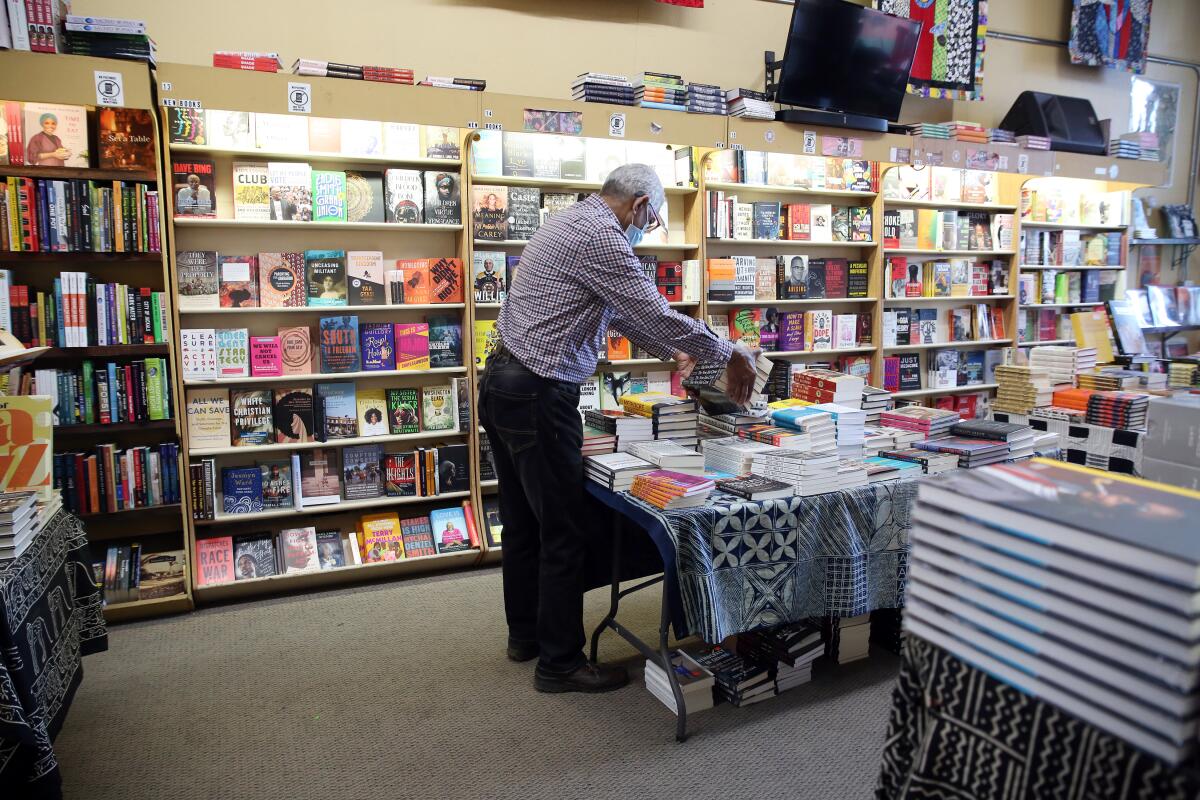
‘October is the new December’
Adding to an already stressful holiday season were concerns about the supply chain: paper shortages in the face of outsize demand, slowed distribution, shipping delays and reduced print runs. In response, stores across the country hoped to bank sales in anticipation of a late-fall wave of infections. Echoing the 2020 drive to boost early voting, the ABA launched marketing programs with mottos like “October is the new December,” urging customers to shop early and shop local.
Cullen believes the effort has helped flatten the sales curve. Some booksellers are still preparing for an influx of last-minute holiday shoppers with extended store hours and revamped websites, but they’re learning to let go of expectations raised by the gradual reopenings of months past.
“People that would’ve [come into the store] a month ago aren’t now, as they are choosing to move more toward springtime protections,” said John Evans, owner of Diesel, A Bookstore, with locations in Brentwood and Del Mar. Though there’s less foot traffic outside the Brentwood shop, customers were dropping by the store and making 15-minute appointments — and waiting in line to do it.
Beloved L.A. bookstores like Diesel are turning to fundraising platforms to survive the financial blows dealt by COVID-19.
They were there, despite rising cases, for the same reason they shop at independent bookstores in the first place: the personal touch.
That is what brought Pacific Palisades resident Wendy Felson to Diesel on Saturday morning. “There’s something so wonderful about walking into a bookstore and browsing and always finding things you didn’t necessarily know about or getting recommendations,” Felson said. “And I’ve always relied on recommendations.”
Despite the dismal winter, booksellers said the spirit of giving is stronger than ever. One Diesel customer bought 200 copies of a children’s book as gifts, declining a volume discount. “We’re thinking of this as an idea, as a gift, so that we can sustain you,” Evans recalled the customer saying. He added, “A lot of people are extremely thoughtful right now, in a very civil way, about the things that they care about.”
Every holiday season, Once Upon a Time brings out the Angel Tree. Customers can pick out an ornament from a tree branch and buy a book for a homeless or at-risk child in the Glendale Unified School District. This year, Palacios reports, the bookstore has broken its donations record. “There’s hundreds, I don’t even know,” she said. “There’s stacks. Boxes. Boxes!”
Ultimately, according to Cullen of the ABA, “the worst business challenge in almost a century” will require more than individual generosity; it will take long-delayed federal action, followed by the eventual return of more casual customers. Failing that, more than one in three small-business owners fear they won’t survive the next three months, according to a survey from the Small Business Majority. And even with help, survival will be case by case.
Diesel’s Evans put it simply at the end of an email: “Wish us luck.”
Chevalier’s and Vroman’s have struggled to stay afloat because of COVID-19. With the imminent holiday season, they’re urging readers to buy more earlier.
More to Read
Sign up for our Book Club newsletter
Get the latest news, events and more from the Los Angeles Times Book Club, and help us get L.A. reading and talking.
You may occasionally receive promotional content from the Los Angeles Times.
